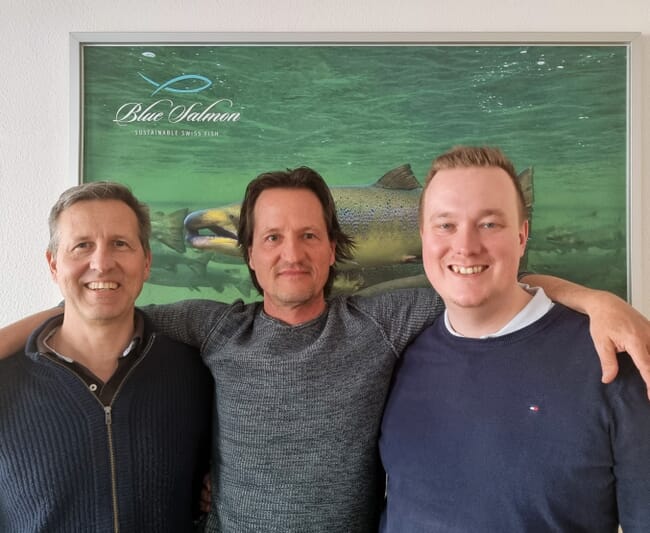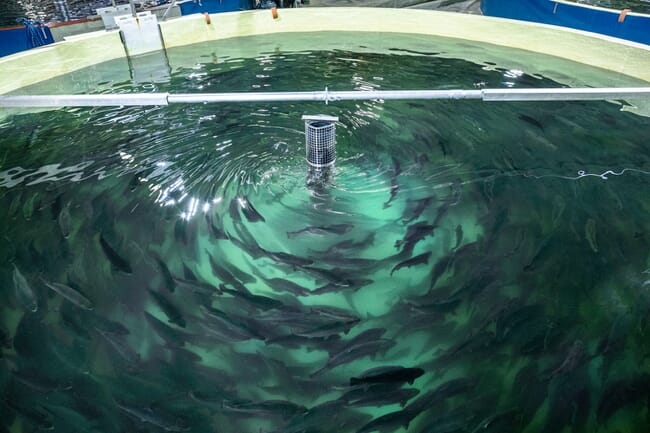
Switzerland imports about 98 percent of the fish it consumes. This arrives by land or by air, which significantly increases the carbon footprint of seafood consumption in the country.
Swiss Blue Salmon and Billund Aquaculture recently entered into a strategic partnership to build the smartest RAS farm in the world in the department of Glarus, which could replace up to 8 percent of salmon imported into the country.
Smart fish farm
This innovative land-based salmon farm will feature the use of state-of-the-art Recirculating Aquaculture Systems (RAS) and cutting-edge technologies, including AI, machine learning, cloud solutions, digitalisation and automatisation.
Sune Moeller, CTO at Swiss Blue Salmon, has even described this as an innovation wheel. “From the fish farmer's point of view, we create a lot of data that gets uploaded to a cloud-based platform and, from there, we can share all raw data with strategic partners like Billund. In turn, Billund will be able to analyse that data and come up with new ideas and solutions, to make sure that both stay on the forefront of their industries."
Local origin
The founder and CEO of Swiss Blue Salmon, Rudolf Ryf, commented that one of his original motivations for creating this company was to address the seafood trade deficit in Switzerland, where almost all fish is imported. “We have good quality water sources in the country and I see an opportunity to build up a Swiss aquaculture industry and reduce the import levels from 98 percent,” he said.
The company also expects to offer guided visits for neighbouring communities to an observation deck within the facility. “We want to be as open and as transparent as possible. Grown-ups and children will be able to come and visit our facility to learn about the process of onshore salmon farming. In this way, we will be able to show them the high levels of animal welfare and hygiene standards we must achieve to deliver a first-class product,” Ryf said. Furthermore, the Swiss firm wants to strengthen ties with local universities, contributing to knowledge creation and the hiring of specialists for this project and its future farming operation.
Moreover, Moeller added that by producing locally, “it gives us a unique opportunity to sell sushi grade fish to local Swiss restaurants, which will be able to serve fish to their customers merely hours after them being harvested at the farm.”

Sustainable production
When it comes to sustainability, the company’s focus is centred on low energy consumption, upcycling of side streams from processing, reduced transportation, and finally decreasing food waste at the stores etc., due to longer shelf-life.
As Switzerland mainly relies on hydropower, Swiss Blue Salmon uses green energy. However, the company is also investing in several energy-saving technologies. Ryf said that “unlike many other farms, we are able to use passive cooling with 6-8 °C lake water while an efficient heat recovery system will be used especially during the wintertime. Likewise, we aim to install solar panels on the roof, which will cover 15-25 percent of our power consumption.”
Moeller added that the sludge resulting from production processes will either be turned into fertiliser or used in a biogas plant locally. “Additionally, we want to utilise 100 percent of the fish, transforming what would otherwise be considered waste into either pharmaceutical grade products, food for human consumption or pet food,” he said.
Meanwhile, Bjarne Hald Olsen, COO and business and development manager at Billund Aquaculture, said that “we are very pleased to enter this strategic partnership with Swiss Blue Salmon. It represents a significant step forward towards the creation of a sustainable Swiss aquaculture industry,” he said.




